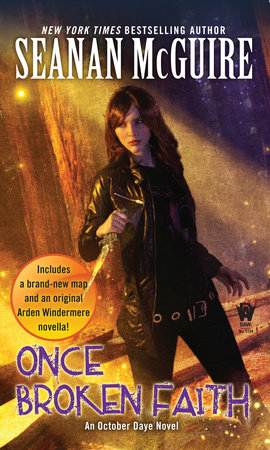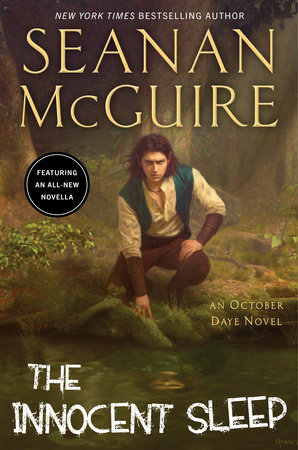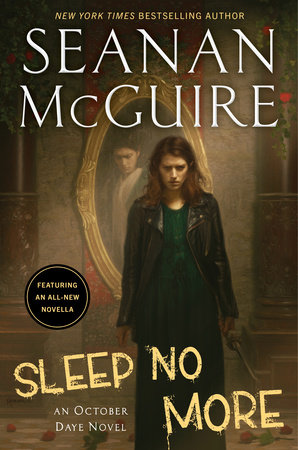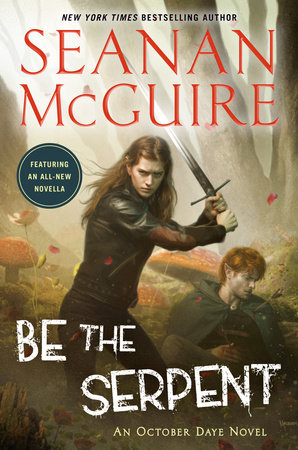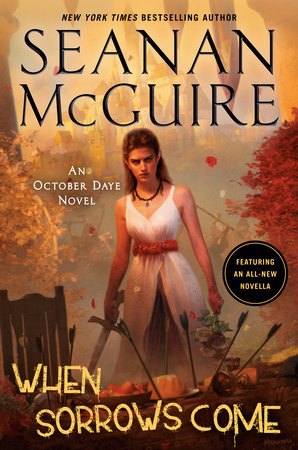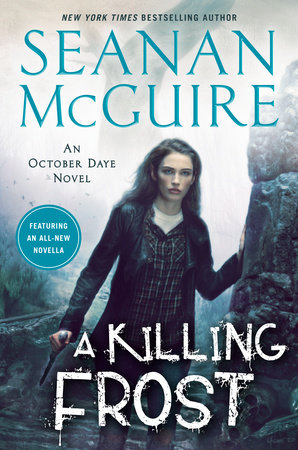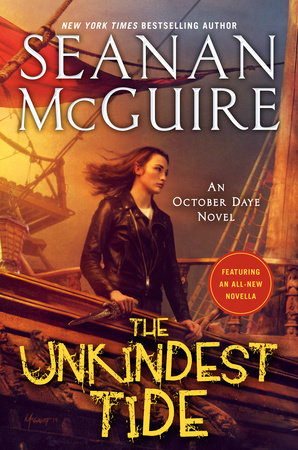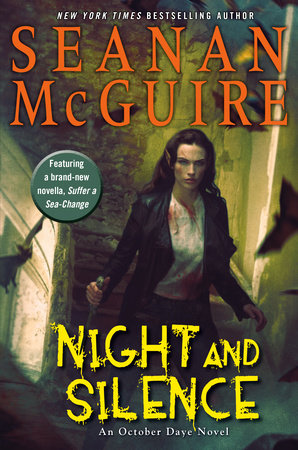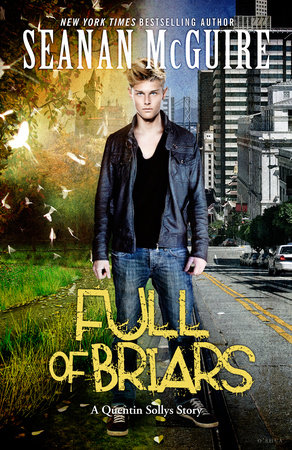Excerpt
Once Broken Faith
OneJune 5th, 2013For trust not him that hath once broken faith.—William Shakespeare,
King Henry VI, Part IIIQuentin and Raj were in the living room arguing about who got to pick the first movie of the night. Loudly. The walls and doors between us were thick enough to blunt their voices—mercifully—but I could still hear more than enough to know that I didn’t want to get involved. I crossed my arms and leaned against the counter, casting a wry look at the kitchen door.
“All right,” I said. “Somebody remind me again why we’re doing this, and why I’m not drowning them both in the bathtub.”
“Drowning Quentin would be an act of treason against the Westlands, and you’d probably be executed,” said May. “Also, you’d miss him.” She never took her eyes off the tray of cookies she was removing from the oven. My Fetch had been baking since she got out of bed. She hadn’t slept much since she’d been elf-shot during our visit to the Kingdom of Silences—she got better, thanks to alchemical intervention—and that meant we had a
lot of cookies. We didn’t have anything near enough for the nightmare that was to come, but still. A
lot of cookies.
The oncoming disaster didn’t keep Jazz from snatching a cookie from the tray and retreating to the kitchen table, juggling her purloined treat from one hand to another the whole time. “Drowning Raj would be an act of treason against the Court of Dreaming Cats, you’d miss him,
and Tybalt would look all sad and noble right before he put you through a wall.”
“Actually, I think if Toby drowns Raj, she’s just proving he was unfit to rule, which means it’s not treason, it’s natural selection. Sort of like you burning your mouth on that cookie is your punishment for stealing it. Tybalt would still probably be pissed, though.” May began shifting the remaining cookies to the cooling rack. Jazz stuck her tongue out. May laughed.
I stayed where I was, avoiding the danger of molten chocolate chips, and grinned to myself. “Oh, right,” I said. “I remember why I agreed to this.” After months—after
years—of chaos and life-threatening situations and people stabbing me for no good reason, we’d somehow managed to find a moment to breathe. That didn’t just deserve to be enjoyed. It deserved to be celebrated, held up as proof that the world was a good place and didn’t actually need to be destroyed in order for me to have a nap.
It used to be that I could have all the naps I wanted. Of course, back in those days, I had few friends, no prospects, and the life expectancy of a stray dog. These days, I have plenty of backup, and no time to sleep. As a knight errant and hero of the realm, any time something goes wrong, it’s likely to become my problem. I’m the go-to girl for terrible adventures, whether I like it or not. Usually not. But things had been pretty calm since my allies and I returned home from overthrowing the puppet government of the Kingdom of Silences. Sure, we’d only been back for six weeks, but I’d take it. It was a hell of a lot better than nothing. I was safe and healthy, my chosen family was safe and healthy, and it was time to stop and smell the flowers.
Just not the roses. I have a bad track record with roses.
The argument in the living room was starting to get really heated. I was considering the wisdom of intervention when the doorbell rang. There was a moment of startled silence before both boys shouted, “I’LL GET IT!” in perfect unison. Then they started sniping at each other again. I pushed myself away from the counter.
“Let’s see if I can answer the door before they finish deciding which one of them gets the honor,” I said.
May snorted. “The future leadership of the Westlands, ladies and gentlemen.”
I left the kitchen and walked down the hall, laughing all the way. Maybe most people don’t have dueling princes in their houses, but this is my life, and I’ve had time to get used to it. I’ve even had time to learn to appreciate it. After all, the princes in question were my squire—Quentin Sollys, who will one day be the High King of the Westlands, the fae Kingdom that encompasses North America—and my fiancé’s adopted nephew, Raj. Since I can’t imagine the world without both those boys in it, I can put up with a little shouting.
My name is October Daye. My father was a human; my mother was, and is, a Firstborn daughter of Oberon, making her one of the more powerful people among the fae, and a definite pain in my still-mortal changeling ass. I was born and raised in San Francisco, which explains my willingness to stay in a city that’s historically been full of people who insist on trying to kill me at the slightest provocation. Faeries are real. Magic is real. My tendency to greet dangerous situations by plunging in headfirst and seeing how long it takes to get myself covered head to toe in blood is also real.
I live an interesting life.
The front door was warded to the point of redundancy. Had whoever was on the porch been human, the warnings about their identity would have reverberated through the house, giving the rest of us time to get any necessary illusions in place. May was the most human looking of our weird little band, and she’d be the one answering the door when the pizzas showed up. In the meantime, since the warnings hadn’t sounded, I was able to unlock and open the door without messing around trying to spin a passable disguise.
My friend Stacy was on the porch with her middle daughter, Karen. At fourteen-going-on-fifteen, Karen no longer looked much like her mother; in fact, the resemblance seemed to decrease year on year. Her skin was milky pale, in contrast to Stacy’s healthy peach, and her hair was the color of birch-bark, save for the tips, which looked like they’d been dipped in ink. Her ears were dully pointed, more like a bobcat’s than a Daoine Sidhe’s, and tufted with fluffy puffs of hair that followed the same black into white pattern as the hair on her head. She was clutching a pillow to her chest. In the interests of expedience, she was already wearing her pajamas, thin cotton patterned in colorful dinosaurs and flaming comets. She was also wearing a bra. That was still relatively new, and hence relatively unsettling. For me, Karen would always be the eleven-year-old I’d saved from Blind Michael’s lands.
Stacy beamed. Karen glanced upward through the fringe of her hair, flashed a shy smile, and went back to looking at her feet.
“Do I smell cookies?” asked Stacy.
I laughed and leaned forward to steal a quick hug before ushering both of them inside. “May’s been baking like a mad thing for hours. I think she’s afraid we’ll be stripped to the bone by a mob of wild teenagers if she doesn’t generate enough unhealthy snacking material.”
“Oh, she’s right,” said Stacy gravely. “I’m just glad you’re the one hosting the slumber party for a change. The last time Anthony played host, I wound up with an empty fridge and two broken windows.”
“I don’t understand why you always call them ‘slumber parties,’ ” said Karen, glancing up again. “You’re picking me up at dawn. That’s
hours before bedtime.”
“Blame our terrible human upbringings, and enjoy the free cookies,” I said. “Do I get a hug?”
Karen smiled, less shyly this time, and moved to hug me. “Hi, Auntie Birdie.”
“Hey, puss,” I said, and kissed the top of her head.
Fae kids are like human kids in many ways. They need love, approval, protection, and occasionally to be sent to their rooms to think about what they’ve done. That doesn’t mean they
are human kids. For one thing, fae kids tend to be nocturnal. Karen wasn’t shining a light on bad parenting when she said dawn was hours before bedtime: she was making a statement of fact. Like most of her contemporaries, she probably went to bed around eight or nine in the morning, and then slept for the normal teenage ten to thirteen hours before getting up and starting her “day.”
Karen’s hair smelled of off-brand shampoo, which I dismissed as irrelevant, and of the cottonwood and quince signature of her magic. The notes had only been becoming really clear over the past few years. Her father, Mitch, was a halfblooded changeling—human mother, fae father—and her mother, Stacy, was a quarterblood, which meant Karen had started with less than the normal percentage of fae blood. It made sense that her magic was weak enough to have taken a long time to clarify. What didn’t make sense was the fact that Karen was an oneiromancer, a dream-walker—one of the first to be seen in Faerie for centuries.
That’s the thing about fae. We’re always full of surprises. Karen tolerated my hug for a few seconds more before squirming away and asking, “Who’s here?”
“You’re the first to arrive,” I said. The boys didn’t count. Quentin lived with me; Raj was at the house enough that he may as well live with me. “Quentin and Raj are in the living room. Stacy? You want a cup of coffee or something before you head home?”
“Can’t,” she said apologetically. “Jessica has therapy.”
“Oh.” I nodded. “All right. Well, give the family my love, and call if you need us to get Karen home.”
“I will,” said Stacy. She hugged me quick, and then she was gone, ghosting out the front door without another word.
Karen and I exchanged a look. Karen spoke first. “Mom’s worried about Jess.”
“Yeah,” I said. “Is she getting any better?”
Karen shook her head. “No.”
“Damn.” I took a deep breath, trying to force my worries down. They didn’t go easy. “Well, let’s get you to the party, okay?”
“Don’t be silly,” said Karen serenely. “It’s not a party until I arrive.”
I laughed and pointed her down the hall. She trotted off, disappearing into the front room. A moment later the timbre of the ongoing argument shifted. I smiled. “A new challenger has arrived,” I murmured, and walked back toward the kitchen.
Stacy Brown and I have been friends since we were younger than Karen was now, two frightened changelings clinging to each other in the mercurial landscape of the Summerlands. I don’t know that I would have survived long enough to run away from home if it hadn’t been for Stacy. Her happy ending had always been about family: finding someone who’d love her and help her raise a house full of changeling children. Karen was the third of five. An impressive achievement by human standards; a virtually unheard of achievement by fae ones. Which had just made things worse when Blind Michael decided to Ride through the Bay Area, snatching three of the Brown children in the process.
Andrew had been so young at the time that he seemed to have emerged mostly unscathed. He still had nightmares sometimes, but having an older sister who could walk in dreams meant he never felt like he was alone. Karen had returned from Blind Michael’s lands quieter, more serious, and more aware of her powers. And Jessica . . .
In some ways, Jessica still hadn’t made it home. She was terrified of the dark. She was even more afraid of any sort of wavering or flickering light. She wet the bed, she woke up screaming, and she refused to be in a room with me. Even though she knew intellectually that I’d saved her, part of her had associated me so absolutely with Blind Michael that she couldn’t be near me. It was hard. I tried to understand, I really did, but . . . that didn’t make it easy.
It was almost a relief to step into the kitchen and find myself looking at a glittering portal in the air. The smell of sycamore smoke and calla lilies had been lain over the top of the more ordinary chocolate chip cookies. I blinked. Then I grinned.
“Guess that potion wore off, huh?”
“Hi!” A girl’s head popped around the edge of the portal, black-haired and copper-eyed and beaming. She looked pleased with herself. I couldn’t blame her. “Oh, gosh, it really worked, didn’t it? Dad! Dad, I opened a door to San Francisco!”
“What?” Etienne sounded equal parts bemused and concerned. He stepped into view, automatically centering himself on the portal. His expression turned nonplussed when he saw me. “Oh. Hello, October.”
I didn’t bother to muffle my grin, which was only getting wider. “Hi, Etienne. I see that everyone’s powers are back to normal.”
“Yes, the potion wore off as scheduled . . . I’m sorry about this. I thought we’d agreed that she would wait to open a gate to your home until
after I had called to get your consent.” He slanted a quick, irritated glance at Chelsea—but all the irritation in the world couldn’t conceal his pride. He was still pretty new to the whole “father” gig, having only learned that he had a teenage daughter the year before. For most of that time, Chelsea’s natural abilities had been suppressed by an alchemical tincture. Now it was gone, and she was showing her dad what she could do.
“Raj invited me,” said Chelsea. “I haven’t been to a slumber party in
years.”
“Chelsea?” As if the sound of his name had summoned him, Raj appeared behind me, standing straighter than normal, like he was trying to make himself look taller. His cheeks reddened at the sight of her, but his expression remained as imperiously calm as ever. “I see the homing stone I gave you has worked as intended. We have chips and dip in the front room.”
“Come on, Dad, can I go through? Please? Pretty please? The gate looks stable, it’s not going to snick me in half or anything, pleeeeease?” Chelsea turned fully to her father, expression pleading. Only the rolled-up sleeping bag under her arm spoiled the illusion of absolute need. Like Karen, she was wearing pajamas. Unlike Karen, her pajamas were patterned with spaceships and planets.
“It appears stable,” said Etienne. “First, you must ask Sir Daye for permission. It is never appropriate to use a gate to enter a knight or noble’s home without their consent.”
Chelsea sighed, looking briefly like the teenage girl she was. Then she turned to me, and said, with perfect courtly grace, “Sir Daye, may I answer your invitation and cross the threshold from my halls into yours?”
It took everything I had to swallow my grin. May was less successful, but as she was out of Chelsea’s line of sight, she probably wasn’t trying as hard. “Yes, you may,” I said. “Come on through. We’re going to order the pizza in about half an hour.”
“Yes!” Chelsea jumped straight through her transit gate, spinning on her toes to wave at Etienne and chirp, “Bye, Daddy! I’ll see you in the morning!” She waved her hand, making a closing gesture, and the gate slammed shut before Etienne could get another word in.
“I don’t know whether that was slick or rude,” I said.
“It doesn’t matter,” said Raj, grabbing Chelsea’s wrist and hauling her out of the kitchen without leaving her time to do more than wave to the rest of us. The argument in the front room changed timbre again only a few seconds later.
I looked at May. She grinned. I grinned back.
“Okay, this was a fantastic idea and we should do it every week,” I said. As if on cue, there was a knock at the back door. I crossed the kitchen to answer it.


